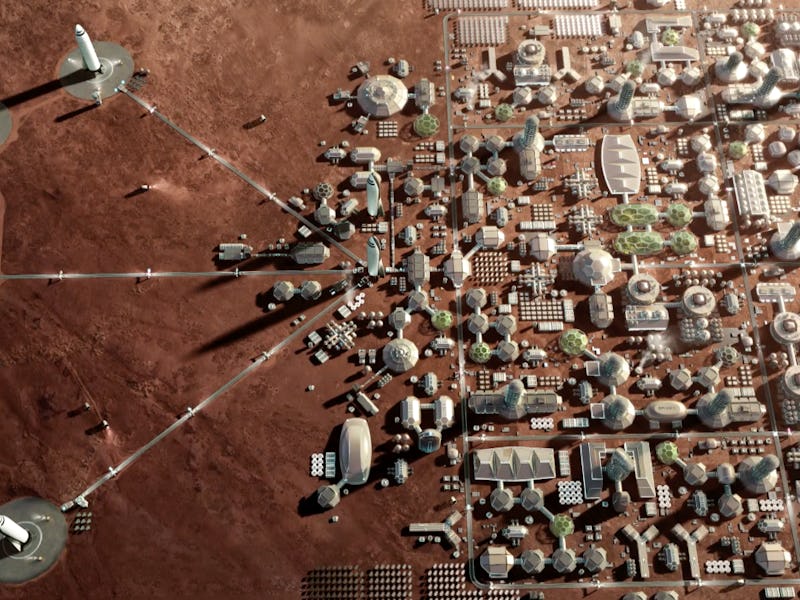SpaceX Mars city: Elon Musk details 1 test its success depends on
SpaceX CEO Elon Musk wants to build a city on Mars, but there's one crucial test that will determine whether his plan is a success.

Elon Musk wants to build a city on Mars, and he already knows what he needs to succeed.
The SpaceX CEO hopes to complete a settlement on the planet by 2050. The city will be fueled and populated using the currently under-development Starship, designed to transport humans to Mars and back. In an appearance at the Mars Society's annual conference last week, Musk detailed the "acid test" that will measure his settlement's success — it also reveals the city's intended goals.
"The acid test, really, is, if the ships from Earth stop coming from any reason, does Mars die out?" Musk told interviewer Robert Zubrin during the livestreamed event.
"For any reason. It could be banal, or it could be nuclear armageddon," he added.
The comments help elucidate one of Musk's main motivations behind the Mars city. Musk, both in this interview and in previous interviews, has warned that the window of opportunity for humanity to venture beyond Earth could close soon after it opens. That's because humans on Earth could be wiped out by global war, natural disaster, or something completely unexpected.
Musk reasons that technology may soon enable humans to settle on other planets, but the window of time between that opportunity emerging and an Earth-wide catastrophe could be surprisingly small. While SpaceX aims to establish a city by 2050, Musk said in the interview that the self-sustainability it needs to survive would "probably not happen in my lifetime."
"We're not in a secure place," Musk said. "Are we going to create a self-sustaining city on Mars before or after World War III? I think the probability of it being created after... hopefully there's never a World War III, but [the probability of creating the city] after is low."
Musk's Twitter musings highlight this problem. His current pinned post reads: "We must pass The Great Filter," likely a reference to one of the explanations for the Fermi Paradox. The paradox was first proposed by scientist Enrico Fermi: If there is likely to be extraterrestrial life in the universe, why haven't we detected it yet?
Humanity's new home?
One theory, explained in a 2014 post on WaitButWhy, suggests there's a wall that almost all species hit during their advancement. Maybe humanity already hit the wall, or it's in the midst of its race toward the wall, or the wall is far off.
The conundrum is summarized by post writer Tim Urban:
"Depending on where The Great Filter occurs, we’re left with three possible realities: We’re rare, we’re first, or we’re fucked."
Zubrin, president of the Mars Society, is no stranger to these ideas. In fact, Zubrin is credited with convincing Musk to set his sights on Mars in the first place. In a February 2020 article, he described a future city as a potential "pressure cooker for invention."
Musk has talked up the prospects for jobs, explaining in 2016 that Mars will need to set up its own sustainable industries, so jobs won't be in short supply.
But his most recent interview suggested that these goals all come secondary to the prize of expanding humankind's footprint beyond Earth.
"Being forever confined to Earth until some eventual extinction event is depressing," Musk said. "We need things that make you want to get out of bed in the morning and be excited about the future, and I think being a space-faring civilization is one of those things that everyone can get excited about."
This could all happen relatively soon. Musk has stated before that his aim would be to send the first cargo ships to Mars by 2022 and the first humans to Mars by 2024 – Mars and Earth are closest around every two years. In last week's interview, Musk suggested the first cargo ships would in fact reach Mars in "maybe four years," suggesting the cargo ships would arrive in 2024. That would suggest the first human flights may not take place for another two years after that – with the Earth and Mars set to come close again in February 2027.
The Inverse analysis – A self-sustaining Martian city could act as more than just a lifeboat for humanity. It could spark new questions about identity and independence. Jim Pass, CEO of the Astrosociology Research Institute, told Inverse in April 2019 that the relationship between the two planets could dictate how Mars-humans see themselves. If the Red Planet doesn't have to rely on shipments from Earth, it could encourage a national identity that rallies around its own story. Mars flag, anyone?
Reaching self-sustainability may ensure our species survival should there be a cataclysmic event here on Earth, but it could also have a profound effect on the new city.
Update 10/21 12:30 p.m. Eastern time: An earlier version of this article stated that SpaceX aims to send the first humans to Mars by 2024. It has since been clarified.
This article was originally published on